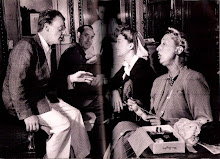
 I recently just watched the 1940 James Cagney movie City for Conquest, and it was dramatically entertaining. James Cagney was absolutely fantastic as Danny Kenny, a truck driver-turned-professional boxer who turns blind after a bout with a boxer with rosin on his gloves. His performance turned the film from clichéd to exciting. To put it simply, he made the film worth watching.
I recently just watched the 1940 James Cagney movie City for Conquest, and it was dramatically entertaining. James Cagney was absolutely fantastic as Danny Kenny, a truck driver-turned-professional boxer who turns blind after a bout with a boxer with rosin on his gloves. His performance turned the film from clichéd to exciting. To put it simply, he made the film worth watching. The film also features young actor Elia Kazan, the future director of On the Waterfront (1954) and A Streetcar Named Desire (1954). If it weren't for Elia Kazan, this movie might have been totally obscure. Anthony Quinn was also in this film but I didn't like him; I thought he wasn't a famous actor but I guess I was wrong. Ann Sheridan was also good but she was kind of a crybaby in this movie. No offense, but I thought the film all together was corny—and Ann Sheridan's constant crying drove it right to the edge of corniness. And the kid actors who were supposed to be playing the main characters as children were too much from California to be talking with New York accents. That's my complaint!
The film also features young actor Elia Kazan, the future director of On the Waterfront (1954) and A Streetcar Named Desire (1954). If it weren't for Elia Kazan, this movie might have been totally obscure. Anthony Quinn was also in this film but I didn't like him; I thought he wasn't a famous actor but I guess I was wrong. Ann Sheridan was also good but she was kind of a crybaby in this movie. No offense, but I thought the film all together was corny—and Ann Sheridan's constant crying drove it right to the edge of corniness. And the kid actors who were supposed to be playing the main characters as children were too much from California to be talking with New York accents. That's my complaint!
 Of course, I felt sorry for James Cagney after he became blind (and I especially felt sorry for him when he was getting hit mercilessly in his last fight but did not feel sorry for him when he got a depressing letter from Sheridan about her prolonged tour) but the rest of the characters I did not care about when their dreams didn't come true—even though I had sympathy for Ann Sheridan's future plans.
Of course, I felt sorry for James Cagney after he became blind (and I especially felt sorry for him when he was getting hit mercilessly in his last fight but did not feel sorry for him when he got a depressing letter from Sheridan about her prolonged tour) but the rest of the characters I did not care about when their dreams didn't come true—even though I had sympathy for Ann Sheridan's future plans.

I didn't really watch the big orchestra number with the orchestra conducted by James Cagney's character's brother because it was a little bit too saccharine. And I didn't really cry at the very ending scene, which is supposed to be a tearjerker, where Ann Sheridan visits James Cagney at the newspaper stand where he now works. Elia Kazan admired James Cagney on set of this film since Cagney was his own pragmatic self and left the set promptly at his own time, no matter if a scene wasn't finished yet. I would recommend this film for James Cagney fans who like watching him in melodramatic films. Again, you folks may comment on this film with your opinions about it, but I'm not forcing you to.















No comments:
Post a Comment